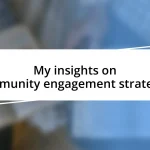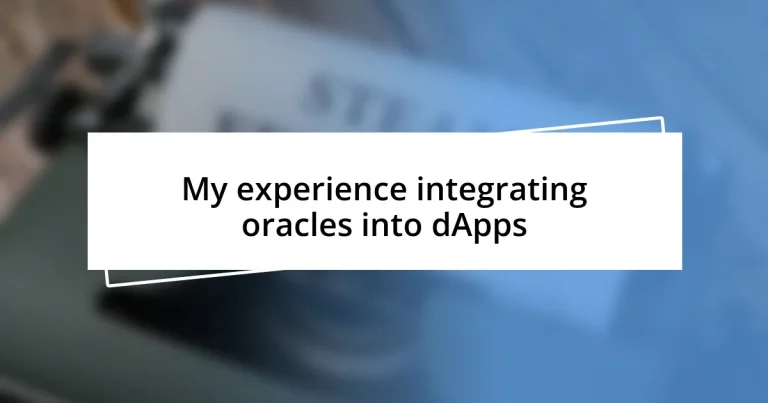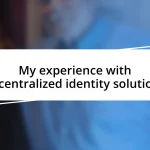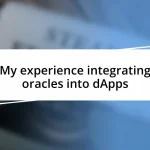Key takeaways:
- Oracles are crucial for connecting dApps with real-time external data, enhancing functionality and user trust through reliable information.
- Choosing the right oracle involves evaluating factors like reliability, speed, cost, scalability, and security to align with the specific needs of the application.
- Real-world applications of oracles in industries such as DeFi, insurance, and gaming demonstrate their potential to innovate and transform user experiences.
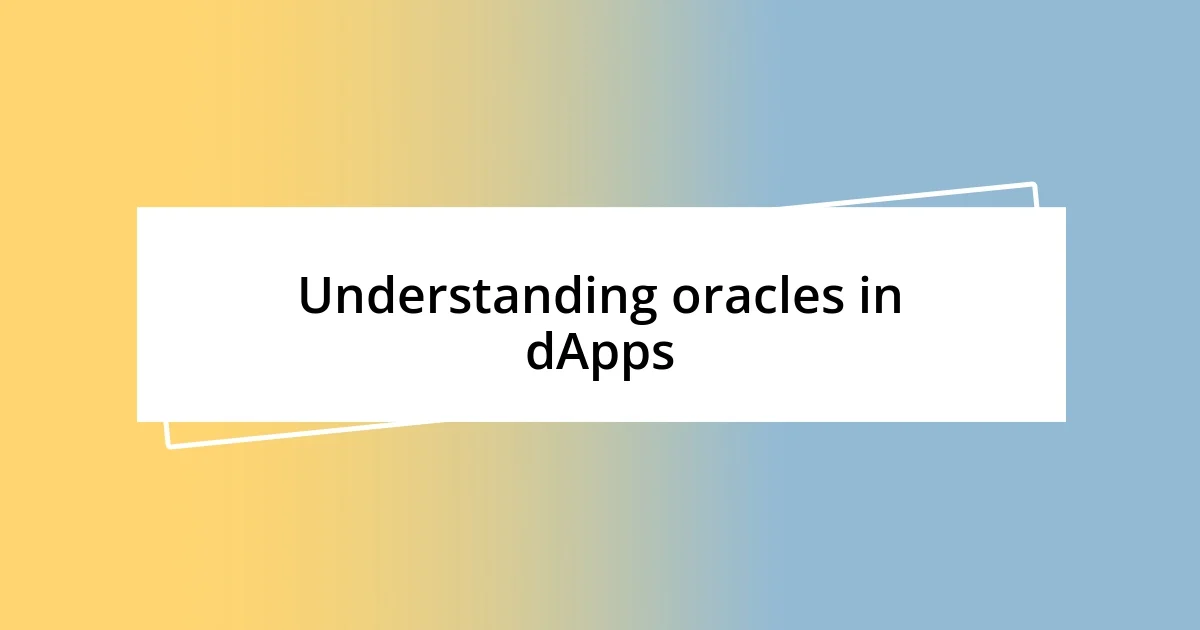
Understanding oracles in dApps
Oracles serve as intermediaries between the blockchain and the external world, delivering real-time data to decentralized applications (dApps). I remember the first time I dove into this concept; it was mind-blowing to think how smart contracts could automatically react to real-world events just by integrating an oracle. Can you imagine the possibilities when your dApp can instantly access price feeds or weather data?
Understanding how oracles work fundamentally changed my perspective on dApp functionality. I once spent hours trying to build a financial application, grappling with the limited data I could access. Then I realized that by incorporating oracles, I could create a more dynamic and responsive user experience. It was like flipping a switch—everything became more interconnected, and the potential for innovation was exhilarating.
Looking back, I often wonder how many developers miss out on this powerful tool. Oracles not only allow for greater flexibility but also enhance user trust in dApps by providing reliable and verifiable data. This trust is essential in today’s digital landscape, where users want assurance that the applications they interact with are both secure and efficient. It’s fascinating how a seemingly simple tool can open so many doors in the world of decentralized technology.
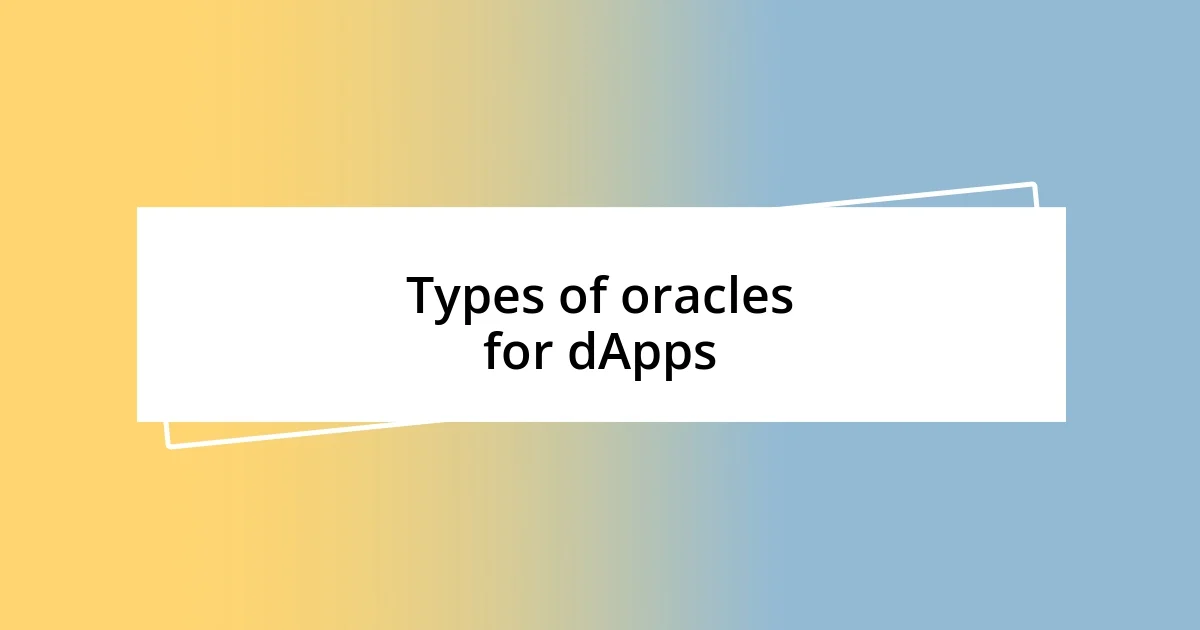
Types of oracles for dApps
When exploring the various types of oracles available for dApps, I quickly discovered that they generally fall into three main categories: centralized, decentralized, and hybrid oracles. Centralized oracles rely on a single source of truth, making them easy to implement but potentially vulnerable to manipulation. I remember the unease I felt when I first realized that a single point of failure could compromise the integrity of my application.
Decentralized oracles, on the other hand, aggregate data from multiple sources, which significantly enhances trustworthiness and reliability. I had the opportunity to work on a dApp that used decentralized oracles for real-time market data. The thrill of watching my smart contracts react to price fluctuations in a secure manner was immensely rewarding. Hybrid oracles bridge the gap between centralized and decentralized approaches, leveraging the speed of centralized sources while maintaining the security of decentralized networks. I love integrating hybrid oracles as they provide a balanced solution—almost like having the best of both worlds.
Understanding these different types of oracles helped me make better design choices for my projects. The right oracle can transform the functionality of a dApp, so I always recommend assessing the needs of the application and the data integrity required before making a decision. Reflecting on my journey, it’s clear that the type of oracle chosen can either bolster the user experience or hinder it.
| Oracle Type | Description |
|---|---|
| Centralized | Single-source data that is easy to implement but can be susceptible to manipulation. |
| Decentralized | Aggregates data from multiple sources, enhancing reliability and reducing single points of failure. |
| Hybrid | Combines elements of both centralized and decentralized oracles for a balanced approach. |
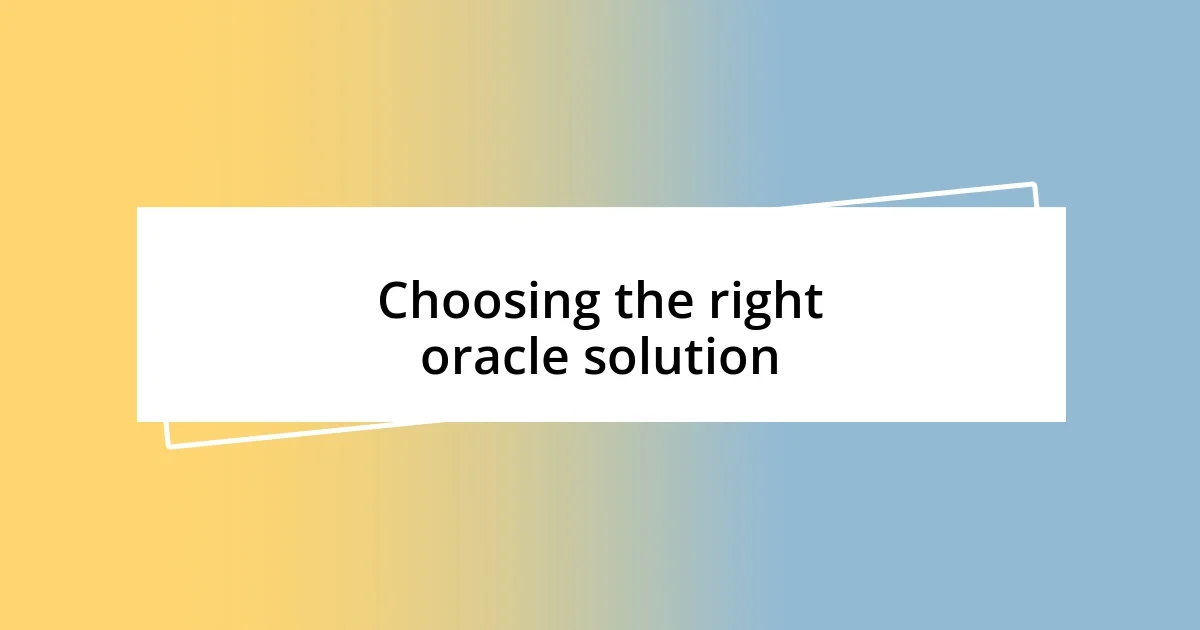
Choosing the right oracle solution
Choosing the right oracle solution can feel overwhelming, but it’s all about aligning the choice with your application’s specific needs. I remember a project early on where I underestimated the significance of data accuracy. We opted for a centralized oracle, thinking it would simplify the process. It was a rude awakening when I discovered discrepancies in the data that affected our users’ experience. That was a pivotal moment of growth for me; it reinforced the importance of thoroughly evaluating oracle options based on the context in which you plan to deploy them.
When considering which oracle to integrate, here are some factors to weigh:
- Reliability: Assess the source’s trustworthiness. Can it provide consistent data?
- Speed: Determine how quickly data is delivered. Will it meet your dApp’s real-time needs?
- Cost: Analyze the pricing structures. Does it fit your budget without sacrificing quality?
- Scalability: Consider if the solution can grow with your dApp. Can it handle an increase in demand?
- Security: Look into the security measures. Is the data protected against attacks or manipulation?
This decision-making process is crucial. With the right oracle, I’ve noticed a significant boost in our dApp’s performance, creating a seamless interaction for users as if we had a direct link to reality. It’s a fantastic feeling when everything runs smoothly simply because I chose wisely.
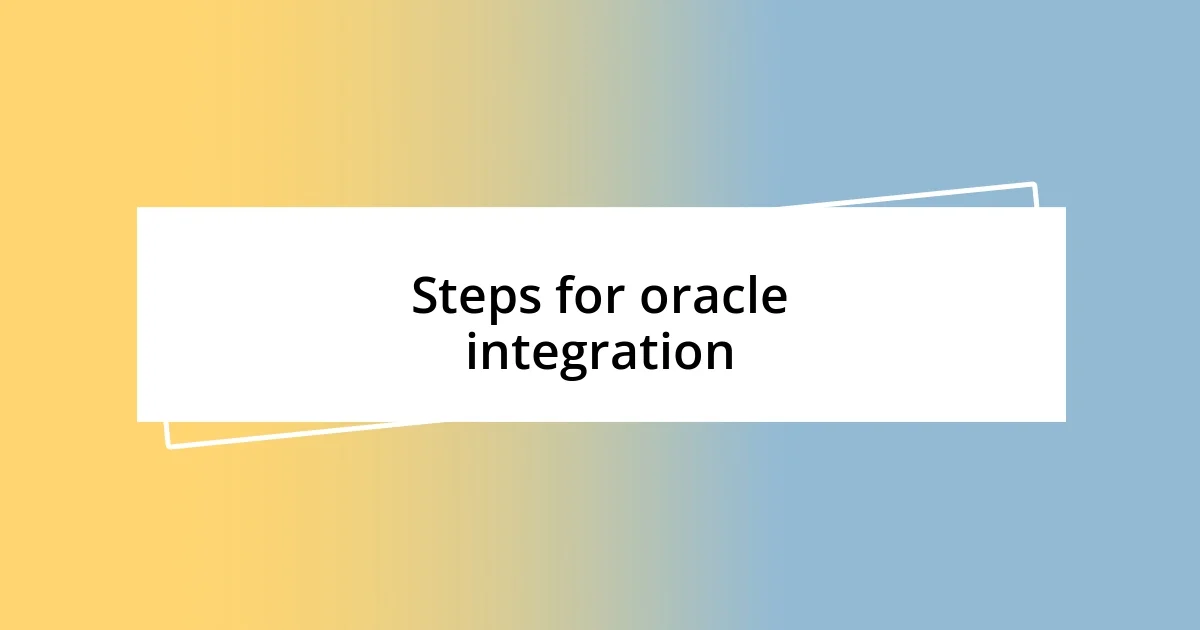
Steps for oracle integration
Integrating an oracle into your dApp isn’t just a technical task; it’s a journey that requires careful planning and execution. The first step I always emphasize is defining the data needs of your application. Without a clear understanding of what kind of external data will enhance your dApp, you might end up with an oracle that doesn’t serve its purpose. I once embarked on a project where we hastily chose an oracle without fully aligning it with our data strategy, and it was frustrating to see our efforts misaligned.
Once you’ve clarified your data requirements, the next step is to evaluate potential oracle providers. This phase can often feel like shopping for the right tool—scouring the options, analyzing reviews, and weighing pros and cons. I vividly recall spending countless hours comparing decentralized oracles. It was both enlightening and overwhelming, but ultimately, it paid off when I found a provider that not only offered robust reliability but also matched our desired speed for real-time interactions.
Finally, don’t overlook the importance of testing your oracle integration comprehensively. I learned early on that deploying an oracle without thorough testing can lead to unexpected errors down the line. I’ll never forget a tense moment when we launched only to find our dApp was responding to incorrect data feeds. It made me realize that no matter how promising the oracle appeared, rigorous testing is non-negotiable. How often do we rush to launch, only to discover that the devil is in the details? Taking the time to ensure everything runs smoothly makes all the difference in the user experience—trust me, it’s worth it!
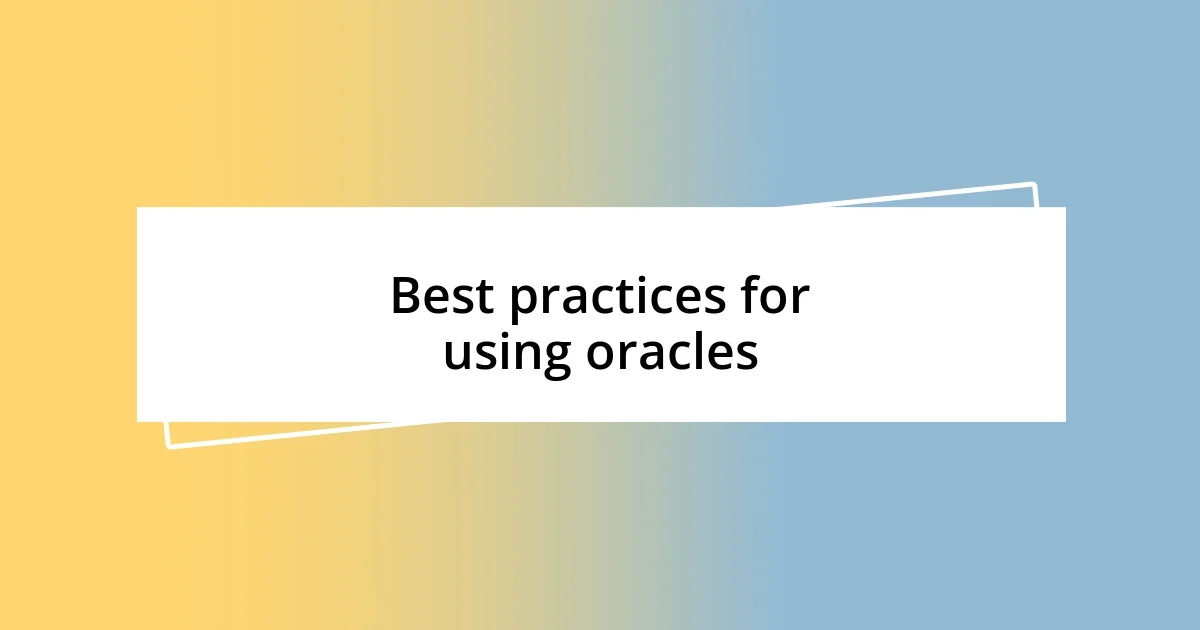
Best practices for using oracles
When using oracles, one essential best practice I’ve found is to ensure a reliable fallback mechanism is in place. Imagine spending weeks integrating an oracle, only for it to fail at a critical moment. I experienced this firsthand during a hackathon. We relied on a single data source, and when it went down, our entire project halted. Implementing backup oracles could have saved us from that panic, allowing for seamless data retrieval even in adverse situations.
Another tip I always recommend is to stay updated on the oracle’s performance metrics. Early on, I took oracle performance for granted, assuming everything would run smoothly. I was blindsided by a sudden drop in response times that I hadn’t tracked closely. That slap in the face taught me to monitor these metrics regularly. After adopting a more proactive approach, I could react swiftly to any fluctuations, ensuring that our users never encountered lag. It’s all about anticipating issues before they impact your dApp.
Lastly, engaging with the community around your chosen oracle can be invaluable. I’ve found that connecting with other developers often opens up avenues for shared insights and troubleshooting help. During one particularly challenging week, I joined a dedicated forum where developers were discussing recent vulnerabilities. Many expressed their frustrations and solutions, and I discovered updates that would have taken me ages to find alone. Being part of a network not only helps in minimizing risks but can lead to innovative ways to leverage the oracle further. Isn’t it interesting how collaboration can amplify our efforts?
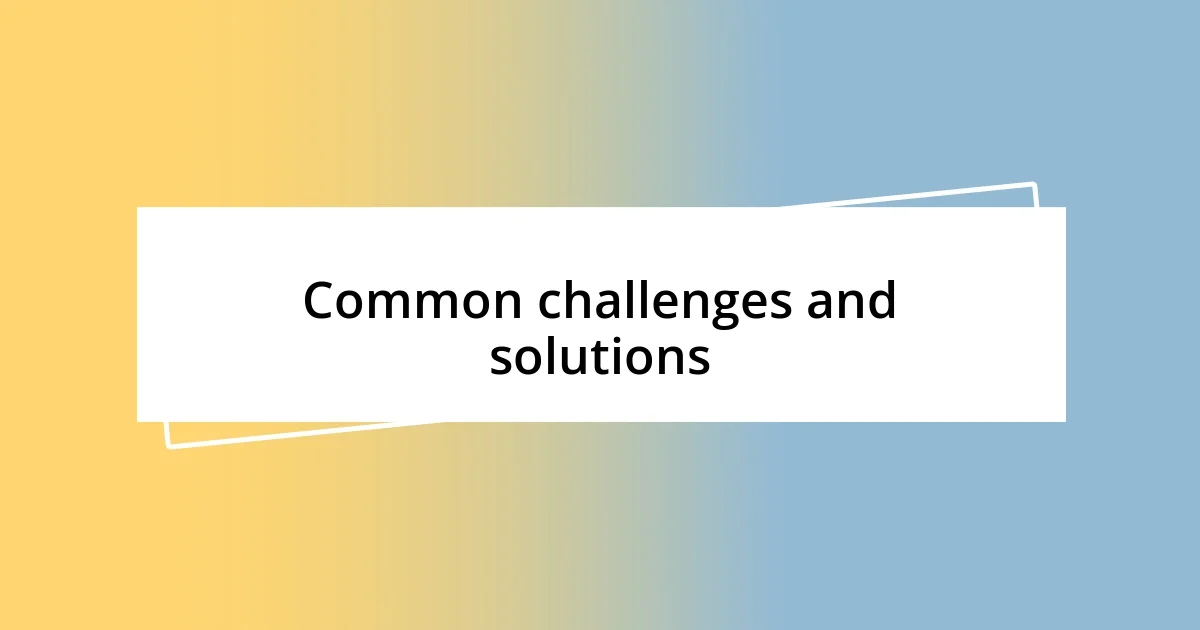
Common challenges and solutions
When it comes to integrating oracles, one common challenge I faced was dealing with latency issues. There was a moment during a project when our app was expected to deliver real-time data, but the oracle’s response time was lagging behind. That gap led to a frustrating user experience, underscoring the importance of matching the oracle’s speed with your app’s requirements. Have you ever been in a situation where your users had to wait longer than expected? It’s not something you want to repeat.
Another hurdle I encountered was ensuring data accuracy. I vividly remember an instance where a data feed we relied on presented outdated information, leading to miscalculations in our dApp. The panic that set in was palpable; it made me realize the vital need for multiple data sources or at least a method to verify the incoming information. What do you do when data integrity is in question? I learned that implementing a verification layer not only fortified our application’s credibility but also built trust with our users.
Lastly, I often grappled with the complexities of security surrounding oracle integration. Security has become such a hot topic in the blockchain world, hasn’t it? During one integration, I overlooked the potential vulnerabilities of data transmission, and it nearly cost us our project. To counter this, I’ve since adopted multifaceted security measures, such as using cryptographic techniques to validate data before it’s utilized. This shift in focus not only enhances the safety of my dApp but also gives me peace of mind as I navigate this decentralized landscape. How reassuring is it to know that you don’t have to compromise on security while leveraging the power of oracles?
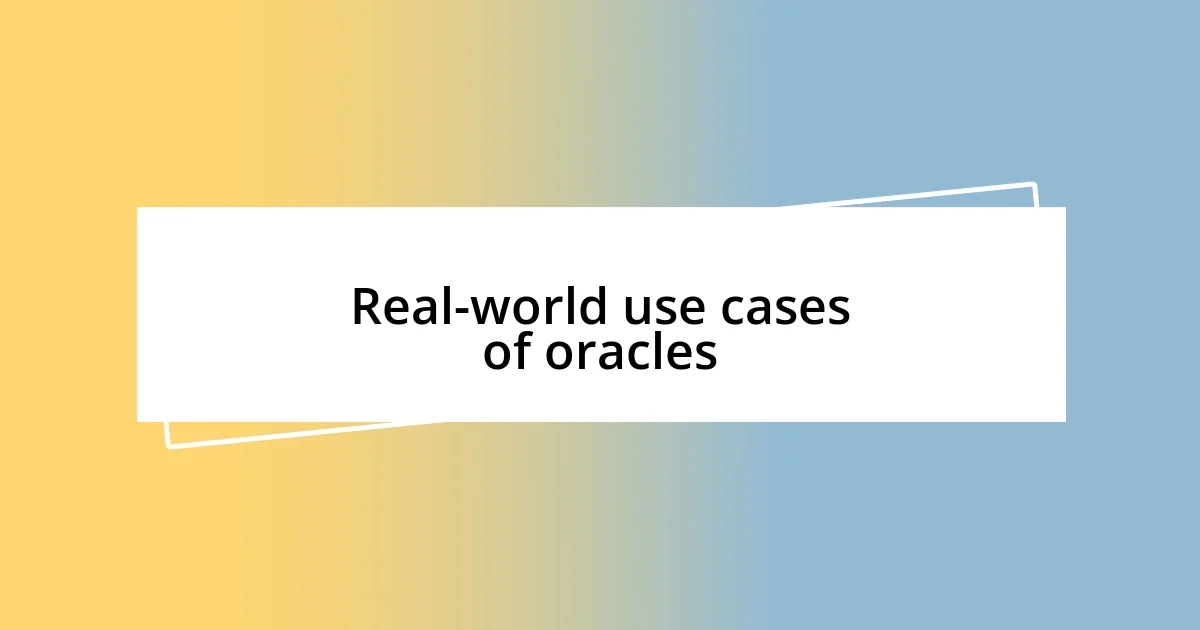
Real-world use cases of oracles
Oracles have found fascinating applications in various industries, enriching the capabilities of decentralized applications. One of the most striking use cases for me was a decentralized finance (DeFi) project that relied on real-time price feeds for asset trading. I remember the excitement when our dApp could automatically adjust trading pairs based on market fluctuations. It felt like witnessing a living, breathing entity respond to the pulse of the financial world! How exhilarating is it to know that technology enables such dynamic interactions?
In the realm of insurance, I encountered a compelling example of oracles being used for parametric insurance. During a pilot project I participated in, we offered policies that automatically triggered payouts based on weather data for natural disasters. The seamless integration of oracles made this possible. The relief on clients’ faces when they received instant compensation for unforeseen events made it clear to me that oracles can significantly enhance trust and efficiency in traditionally cumbersome processes. Have you ever wondered how much smoother life could be when resources respond to real-world conditions without delay?
Gaming is another area I find captivating when it comes to oracle integration. I recall working on a blockchain-based game where we used oracles to provide external game mechanics, like randomized loot drops tied to live sports events. Engaging players in real-time betting as they watched games unfold was an exhilarating concept. It opened a debate about the future of gaming—how might player involvement evolve when we incorporate unpredictable real-world events? Ultimately, oracles are not just tools; they’re gateways to innovation that can redefine user experiences across sectors.







